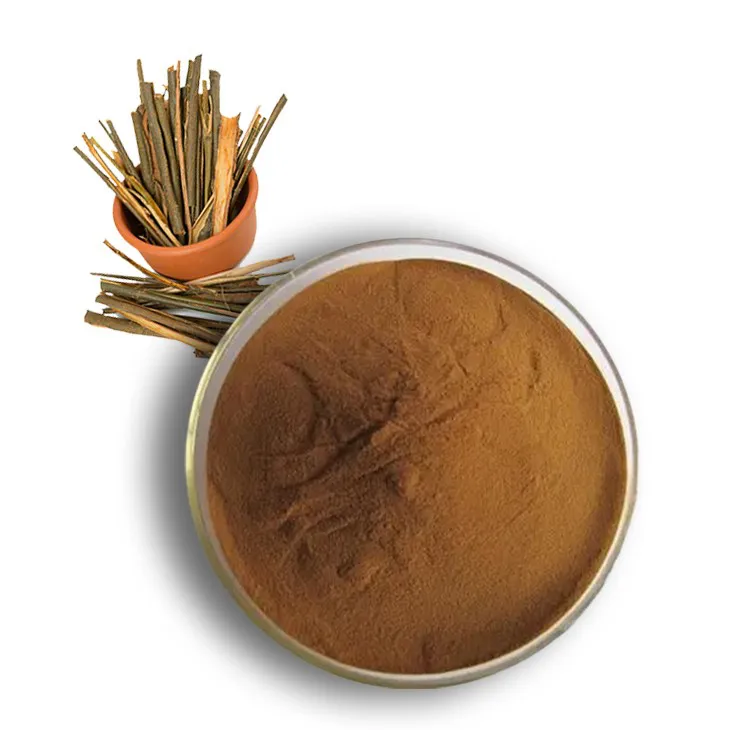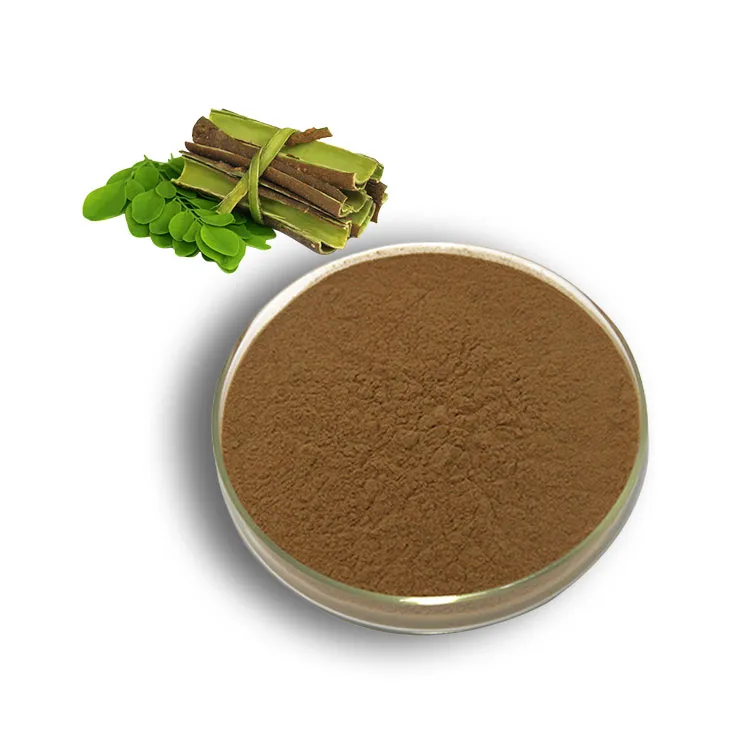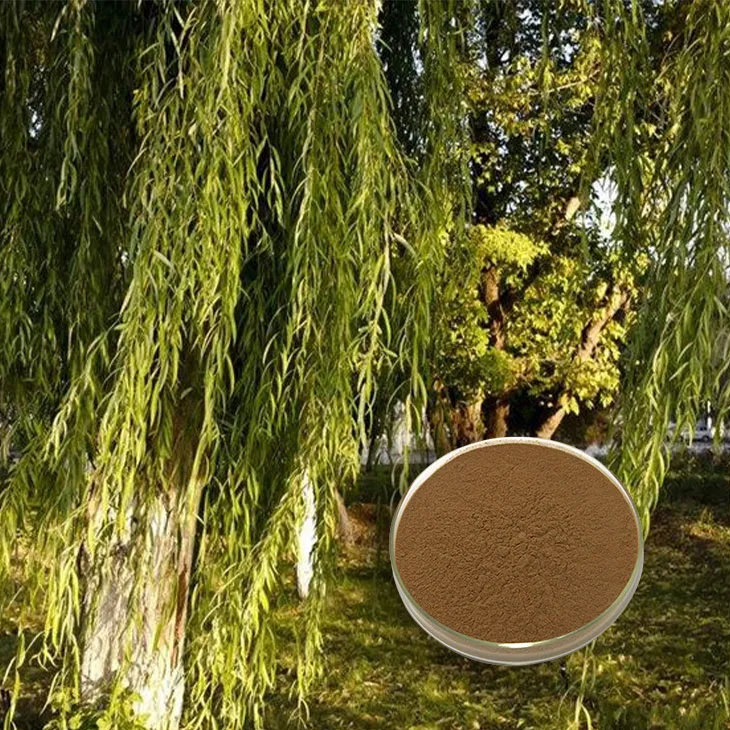- 0086-571-85302990
- sales@greenskybio.com
White willow bark extract: Is the extract effective for weight loss?
2024-11-13

Introduction
White Willow Bark Extract has been a subject of interest in the realm of natural remedies for various health conditions. It has a long - standing history of use in traditional medicine. In recent times, with the growing focus on weight management, questions have arisen regarding whether this extract can play a role in weight loss. This article aims to comprehensively analyze the available information on White Willow Bark Extract in relation to weight loss.

Chemical Composition of White Willow Bark Extract
The main component of white willow bark extract is salicin. Salicin is a glycoside that has been studied for its multiple properties. When ingested, it is metabolized in the body to produce salicylic acid, which is related to aspirin. In addition to salicin, the extract also contains other phenolic compounds, flavonoids, and tannins. These components may interact with each other and with the body's physiological processes in different ways.

Anti - Inflammatory Properties
The Role of Salicin in Inflammation
As mentioned earlier, salicin in white willow bark extract has anti - inflammatory effects. It works in a similar way to aspirin, by inhibiting the production of certain inflammatory mediators in the body. Inflammation in the body can be caused by various factors such as diet, stress, and environmental toxins. Chronic inflammation has been associated with a number of health problems, including metabolic disorders.
Link between Inflammation and Metabolism
There is evidence to suggest that inflammation can disrupt normal metabolic processes. For example, it can interfere with insulin sensitivity, leading to problems with blood sugar regulation. It can also affect the function of adipose tissue (fat cells), causing abnormal lipid metabolism. By reducing inflammation, white willow bark extract may potentially improve these metabolic functions. However, it is important to note that while the anti - inflammatory effects are well - established, the direct link to improved metabolism and subsequent weight loss is not yet fully understood.
Possible Mechanisms of Action for Weight Loss
Metabolic Rate Increase
One theory is that white willow bark extract could increase the body's metabolic rate. A higher metabolic rate means that the body burns more calories at rest. This could potentially lead to weight loss over time. The extract may achieve this by influencing the function of mitochondria, the powerhouses of the cells. Mitochondria are responsible for energy production in the form of ATP. If the extract can enhance mitochondrial function, it may increase the overall energy expenditure of the body. However, current research on this specific mechanism in relation to white willow bark extract is limited.
Appetite Suppression
Another possible mechanism is appetite suppression. Some natural substances can affect the hormones and neural signals in the body that regulate appetite. It is hypothesized that white willow bark extract may interact with the hypothalamus, the part of the brain that controls hunger and satiety. By modulating the signals in the hypothalamus, the extract could potentially reduce food intake. For example, it may affect the levels of hormones such as ghrelin (the "hunger hormone") and leptin (the "satiety hormone"). However, there is currently no conclusive evidence to support this hypothesis.
Current State of Research
Animal Studies
In some animal studies, white willow bark extract has shown promising results in relation to weight management. For example, in a study on obese rats, those given white willow bark extract had a reduction in body weight compared to the control group. However, it is important to note that animal studies do not always translate directly to humans. Animals have different physiological and metabolic characteristics compared to humans.
Human Studies
In human studies, the evidence regarding the effectiveness of white willow bark extract for weight loss is less clear. There have been some small - scale trials, but the results have been inconsistent. Some studies have reported a slight decrease in body weight or body fat percentage in participants taking white willow bark extract supplements, while others have found no significant difference compared to placebo groups. One of the challenges in human studies is controlling for other factors that can influence weight, such as diet, exercise, and lifestyle.Potential Side Effects and Precautions
While white willow bark extract is generally considered safe when used appropriately, it can have some potential side effects. Since it is related to aspirin, it may cause similar side effects such as stomach irritation, nausea, and an increased risk of bleeding in some individuals. People with certain medical conditions, such as ulcers, bleeding disorders, or those taking anticoagulant medications, should avoid using white willow bark extract without consulting a healthcare provider.
Conclusion
In conclusion, white willow bark extract has some interesting properties, particularly its anti - inflammatory effects. While there are some theories suggesting potential mechanisms by which it could aid in weight loss, such as increasing metabolic rate or suppressing appetite, the scientific evidence is currently inconclusive. More research, especially large - scale, well - controlled human studies, are needed to determine whether white willow bark extract can be an effective aid in weight loss. Until then, individuals should be cautious when using it for this purpose and should always consult a healthcare professional.
FAQ:
1. What is white willow bark extract?
White willow bark extract is a substance obtained from the bark of the white willow tree. It contains salicin, which is known for its anti - inflammatory properties. It has been used in traditional medicine for various purposes.
2. How could white willow bark extract potentially affect weight loss?
Some theories propose that since it contains salicin with anti - inflammatory effects, by reducing inflammation in the body, it might influence metabolism. However, this is still a hypothesis and not firmly established as a direct cause - and - effect relationship for weight loss.
3. Is there strong scientific evidence for white willow bark extract aiding in weight loss?
No, as of now, the scientific evidence regarding its direct impact on weight loss is inconclusive. While there are some theories about its potential influence on metabolism through anti - inflammation, more research is needed to prove a definite connection.
4. What are the other benefits of white willow bark extract apart from potential weight loss?
Due to its salicin content, it has well - known anti - inflammatory effects. It may also be beneficial for pain relief, similar to aspirin which is a synthetic derivative of salicin. Additionally, it may have antioxidant properties, although more research is required to fully understand all of its benefits.
5. Are there any side effects of using white willow bark extract?
Yes, there can be side effects. Since it contains salicin, it may cause stomach irritation, ulcers, or allergic reactions in some individuals. It can also interact with certain medications, such as blood - thinning drugs. Therefore, it is important to consult a healthcare provider before using white willow bark extract.
Related literature
- White Willow Bark: A Natural Anti - Inflammatory Agent and Its Potential Applications"
- "The Role of Salicin - containing Compounds in Metabolism and Health"
- "Investigating the Link between Anti - Inflammatory Agents and Weight Management"
- ▶ Hesperidin
- ▶ Citrus Bioflavonoids
- ▶ Plant Extract
- ▶ lycopene
- ▶ Diosmin
- ▶ Grape seed extract
- ▶ Sea buckthorn Juice Powder
- ▶ Fruit Juice Powder
- ▶ Hops Extract
- ▶ Artichoke Extract
- ▶ Mushroom extract
- ▶ Astaxanthin
- ▶ Green Tea Extract
- ▶ Curcumin
- ▶ Horse Chestnut Extract
- ▶ Other Product
- ▶ Boswellia Serrata Extract
- ▶ Resveratrol
- ▶ Marigold Extract
- ▶ Grape Leaf Extract
- ▶ New Product
- ▶ Aminolevulinic acid
- ▶ Cranberry Extract
- ▶ Red Yeast Rice
- ▶ Red Wine Extract
-
Avocado Extract Powder
2024-11-13
-
Shikonin
2024-11-13
-
Tongkat Ali Extract Powder
2024-11-13
-
Wheat Germ Extract
2024-11-13
-
Yohimbine Bark Extract
2024-11-13
-
Camu Camu Extract
2024-11-13
-
Lemon Extract
2024-11-13
-
Ivy Extract
2024-11-13
-
Sophora Japonica Flower Extract
2024-11-13
-
Acai Berry Extract
2024-11-13





















